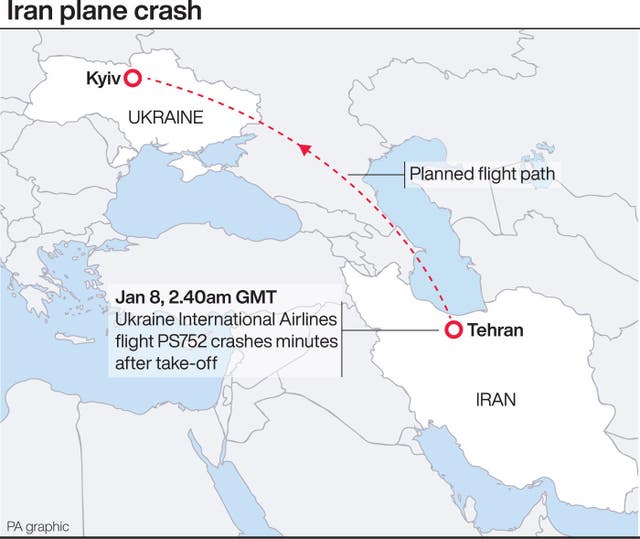
Three Britons are among the dead after a Ukrainian passenger plane crashed moments after take-off from Iran, with investigators now focusing on how the aircraft fell out of the sky.
The victims included engineer Sam Zokaei, from Surrey, Saeed Tahmasebi Khademasadi, from west London, and Mohammad Reza Kadkhoda Zadeh, from near Brighton.
All three were named on the list of 167 passengers on board flight PS752 by Ukraine International Airlines (UIA), which crashed moments after it left Imam Khomeini International Airport in Tehran at 6.10am local time (2.40am GMT) on Wednesday, bound for the Ukrainian capital Kyiv.

Nine members of crew and at least 26 children were also on board, according to the flight manifest.
The Iranian military disputed suggestions the airliner was brought down by a missile, something Downing Street added there was “no indication” of, after the Ukrainian authorities refused to rule out the prospect.
Officials in Iran blamed an engine fire, while the Ukrainian president ordered a criminal investigation into the crash.
Announcing that a team of security officials and experts will fly to Iran to aid the investigation, Volodymyr Zelenskyy added: “Our priority is to establish the truth and those responsible for this terrible catastrophe.”
The airline ruled out human error, and crew were not said to have made an emergency call.

The airline said: “According to our records, the aircraft ascended as high as 2,400 metres.
“Given the crew’s experience, error probability is minimal. We do not even consider such a chance.”
The crash comes amid escalating tension in the Persian Gulf following the killing last week of Iranian General Qassem Soleimani by the US, prompting several airlines to reroute flights away from Tehran’s airspace.
Tributes poured in for the victims after their names were released by the airline.

Mr Tahmasebi, 35, married his Iranian partner 34-year-old Niloufar Ebrahim last year. She was also named among the casualties by the airline.
A spokesman for Imperial College London, where Mr Tahmasebi was a post-graduate researcher, said: “We are deeply saddened at this tragic news.
“Saeed Tahmasebi Khademasadi was a brilliant engineer with a bright future.
“His contributions to systems engineering earned respect from everyone who dealt with him and will benefit society for years to come.
“He was a warm, humble and generous colleague and close friend to many in our community.”

Mr Tahmasebi was also an engineer at Laing O’Rourke.
A company spokesman said: “Everyone here is shocked and saddened by this very tragic news.
“Saeed was a popular and well respected engineer and will be missed by his colleagues.”
Staff at BP, Mr Zokaei’s employer, also paid tribute to their 42-year-old colleague.
A spokesman said: “We are shocked and deeply saddened by this tragic loss of our friend and colleague and all of our thoughts are with his family and friends.”
There was no answer from the home of Mr Kadkhoda Zadeh’s father in Haywards Heath.
The 40-year-old is listed as owning a dry cleaning business.
Staff at nearby Hassocks Pet Centre remembered “a lovely man [with] a lovely smile”.
Store owner Stephen Edgington, 68, said: “Reza was a lovely guy. He was good looking, sociable.
“Before he left we were chatting and he said: ‘Do you realise I have been here so many years?’.”
Ukrainian Foreign Minister Vadym Prystaiko confirmed the death toll also involved 82 Iranians, 63 Canadians, 11 people from the Ukraine, nine of whom were crew members, 10 Swedes, four Afghans and three Germans.
He said: “An investigation commission should be set up of representatives of the civil and aviation agencies responsible for civil aviation. We have to work out all the possible versions.
“Regardless of the conclusions regarding the causes of the Iranian catastrophe, the airworthiness of the entire civilian fleet will be tested.
“I keep all measures on personal control. I very much ask everyone to refrain from speculation and putting forward untested versions of the disaster before the official announcements.”
Qassem Biniaz, a spokesman for Iran’s Road and Transportation Ministry, said it appears a fire had started in one of the plane’s engines.
The pilot then lost control of the plane, sending it crashing into the ground, Mr Biniaz said, according to the state-run IRNA news agency.
Ukrainian officials initially agreed with Iran, but later declined to offer a cause while the investigation is under way.
Aviation expert David Learmount said: “Whatever it was, it was very dramatic and very sudden because the crew were not able to make an emergency call.
“Whatever it was it was very dramatic and you try to work out what very dramatic thing can go wrong with an airliner and you can’t really come up with anything.”
A Boeing statement said: “We are ready to assist in any way needed.”
The airline said the aircraft was a 737-800, built in 2016.
A number of 737-800 models have been involved in deadly accidents over the years.
However, it is a different model to the Boeing 737 Max 8 jets, which were grounded around the world following the crash of an Ethiopian Airlines plane that killed 157 people shortly after take-off from Addis Ababa in March last year.
The Foreign Office has advised against all travel to Iran for British-Iranian nationals, with a slightly downgraded warning advising against all but essential travel for British nationals.


Comments: Our rules
We want our comments to be a lively and valuable part of our community - a place where readers can debate and engage with the most important local issues. The ability to comment on our stories is a privilege, not a right, however, and that privilege may be withdrawn if it is abused or misused.
Please report any comments that break our rules.
Read the rules here